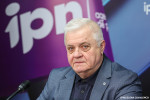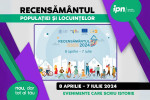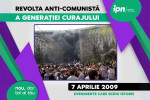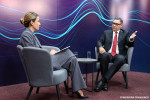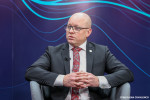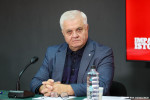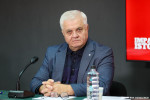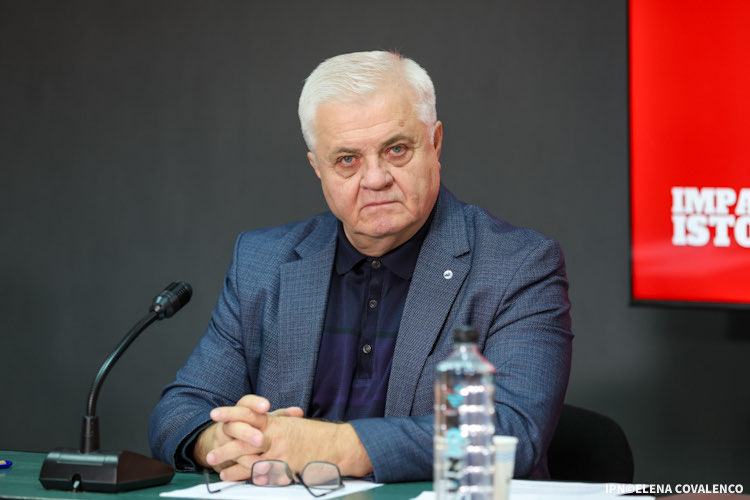
 |
|
| Anatol Țăranu | |
Distribution of voting intention and political context
According to the opinion polls, four parties have a significant chance of entering the next Parliament. PAS leads in voter preference with between 26.5% and 29.8%. The Party of Socialists of the Republic of Moldova (PSRM) ranks second, with results between 11.2% and 13.6%. Partidul Nostru (6.1%-7.9%) and the Alternative Bloc (7.7%) are also likely to exceed the 5% electoral threshold.
An important factor is the large number of undecided or undecided voters, which could have a significant influence on the election results.
The current political context in the Republic of Moldova is marked by tensions and challenges, with no signs of easing. Recently, the Chisinau authorities expelled three Russian diplomats, accusing Moscow of involvement in facilitating the escape of a pro-Kremlin MP convicted of illegal political financing. Such incidents highlight external influences on domestic politics and the vulnerability of the electoral process to geopolitical factors.
Most experts warn that the 2025 elections will be decisive for the country's geopolitical future, placing Moldova at the crossroads between European integration and Russian influence. In addition, there are indications that Russia could intensify destabilizing actions through hybrid attacks and influencing the electorate through politically corrupt methods, favouring forces hostile to the country's European course.
The pro-Russian party
On the Moldovan political scene, several pro-Russian-oriented political parties and blocs have announced their intention to participate in the 2025 elections. These parties are counting on the support of a significant segment of the Moldovan electorate, which is pro-Russian to varying degrees.
One of the main players in this bloc is the Alliance of Socialists and Communists, which is targeting the hard core of the pro-Russian electorate. This category of voters, estimated at around 20% of the total electorate, consistently supports a Moscow orientation at the expense of European integration.
Another important component of the pro-Russian party is the conglomerate of political parties coordinated by the fugitive Ilan Shor. This bloc bases its influence on an extensive network of territorial leaders, activists and affiliated structures, which receive substantial funding from external sources. Shor's network has proven its effectiveness in mobilizing voters in previous parliamentary elections, in last autumn's referendum and in supporting former anti-corruption prosecutor Victoria Furtuna in the presidential elections. The electoral base of this group is represented by the socially vulnerable segments, whose vote is decisively influenced by politically corrupt practices. It is estimated that this electorate represents between 10% and 15% of all Moldovan voters.
Another important player is the political bloc "Alternativa", founded by Chisinau Mayor Ion Ceban, together with other political leaders such as Alexandr Stoianoglo, Ion Chicu and Mark Tkaciuk. Although "Alternativa" presents itself as a pro-European force, multiple media sources and political analysts have raised questions about its true orientation, suggesting pro-Russian sympathies. This political bloc brings together leaders and parties with pro-Russian backgrounds, but promotes a moderate Moldovanist message without overt anti-Romanian overtones. With this strategy, "Alternativa" could attract between 10% and 20% of the electorate, especially voters disillusioned with PAS party policies.
Under certain circumstances, the pro-Russian party could also count on the support of the Our Party, led by Renato Usatii. Although this party does not take an explicit geopolitical stance, it could take advantage of the political conjuncture and tip the balance in favor of a pro-Russian alliance.
The pro-European party
The pro-European flank of the Moldovan political scene is dominated by the Action and Solidarity Party (PAS), which, after its landslide victory in the last parliamentary elections, formed a one-party government with a comfortable majority of 63 seats.However, PAS is currently facing a significant decline in popularity, which considerably reduces its chances of regaining a parliamentary majority. The most optimistic polls estimate that PAS could win between 40 and 45 seats in the 2025 elections, forcing it to seek partners to form a pro-European coalition government.
A viable option for consolidating a pro-European majority is for PAS's potential allies among political parties with a clear pro-European orientation to cross the electoral threshold, including the Dignity and Truth Platform (DA), the Party of Change and the League of Cities and Communes (LOC), which are part of the political bloc "Together". These three parties signed a long-term partnership agreement in December 2023, with the aim of supporting each other at local level and participating with a joint list in the parliamentary elections. The Party of European Social Democrats (PSDE) and the Coalition for Unity and Welfare (CUB) also complete the pro-European camp.
However, the problem with these potential PAS partners is that they have difficulty in crossing the electoral threshold, and most of them do not even come close, according to sociological estimates.Although promoting a pro-European discourse similar to that of PAS, these parties are trying to convince the electorate that they could manage the European integration process more efficiently.Partidul Nostru (6.1%-7.9%) and the Alternative Bloc (7.7%) are also likely to exceed the 5% electoral threshold. An important factor is the large number of undecided or undecided voters, which could have a significant influence on the election results.
The current political context in the Republic of Moldova is marked by tensions and challenges, with no signs of easing.Recently, the Chisinau authorities expelled three Russian diplomats, accusing Moscow of involvement in facilitating the escape of a pro-Kremlin MP convicted of illegal political financing.Such incidents highlight external influences on domestic politics and the vulnerability of the electoral process to geopolitical factors. Most experts warn that the 2025 elections will be decisive for the country's geopolitical future, placing Moldova at the crossroads between European integration and Russian influence.
In addition, there are indications that Russia could intensify destabilizing actions through hybrid attacks and influencing the electorate through politically corrupt methods, favouring forces hostile to the country's European course. The pro-Russian party On the Moldovan political scene, several pro-Russian-oriented political parties and blocs have announced their intention to participate in the 2025 elections.
These parties are counting on the support of a significant segment of the Moldovan electorate, which is pro-Russian to varying degrees.
One of the main players in this bloc is the Alliance of Socialists and Communists, which is targeting the hard core of the pro-Russian electorate.This category of voters, estimated at around 20% of the total electorate, consistently supports a Moscow orientation at the expense of European integration.
Another important component of the pro-Russian party is the conglomerate of political parties coordinated by the fugitive Ilan Shor.This bloc bases its influence on an extensive network of territorial leaders, activists and affiliated structures, which receive substantial funding from external sources.Shor's network has proven its effectiveness in mobilizing voters in previous parliamentary elections, in last autumn's referendum and in supporting former anti-corruption prosecutor Victoria Furtună in the presidential elections.
Thus, the success of the 2025 parliamentary elections for the pro-European forces will depend on their ability to strike a balance between unity and diversity, to avoid dispersion of votes and to propose to voters a clear and realistic vision for the future of the Republic of Moldova in the European Union.
IPN publishes in the Op-Ed rubric opinion pieces submitted by authors not affiliated with our editorial board. The opinions expressed in these articles do not necessarily coincide with the opinions of our editorial board.




